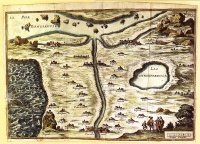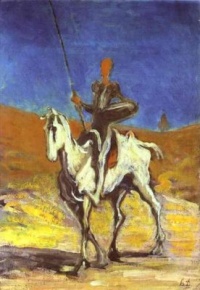Imagination
From The Art and Popular Culture Encyclopedia
| Revision as of 17:10, 31 October 2022 Jahsonic (Talk | contribs) ← Previous diff |
Revision as of 17:12, 31 October 2022 Jahsonic (Talk | contribs) Next diff → |
||
| Line 13: | Line 13: | ||
| One hypothesis for the evolution of human imagination is that it allowed [[consciousness|conscious]] beings to solve problems (and hence increase an individual's [[fitness (biology)|fitness]]) by use of mental [[simulation]]. | One hypothesis for the evolution of human imagination is that it allowed [[consciousness|conscious]] beings to solve problems (and hence increase an individual's [[fitness (biology)|fitness]]) by use of mental [[simulation]]. | ||
| + | ==History== | ||
| + | ''Imaginatio'' is the standard Latin translation of the Greek term ''phantasia''. [[Aristotle]] in ''[[On the Soul]]'' considered ''phantasia'' (imagination) as the capacity for making mental images, and distinguished it from perception and from thinking. He held however that thought was always accompanied by an image. | ||
| + | |||
| + | The notion of a "[[mind's eye]]" goes back at least to [[Cicero]]'s reference to '''''mentis oculi''''' during his discussion of the orator's appropriate use of [[simile]]. | ||
| + | |||
| + | In this discussion, Cicero observed that allusions to "the [[Gulf of Gabès|Syrtis]] of his patrimony" and "the [[Charybdis]] of his possessions" involved similes that were "too far-fetched"; and he advised the orator to, instead, just speak of "the rock" and "the gulf" (respectively) — on the grounds that "the eyes of the mind are more easily directed to those objects which we have seen, than to those which we have only heard". | ||
| + | |||
| + | In medieval [[faculty psychology]], the imagination was one of the [[five wits|inward wits]] along with [[memory]] and the [[sensus communis]]. It allowed the recombination of images, for example by combining perceptions of gold and mountain to obtain the idea of a golden mountain. | ||
| + | |||
| + | The concept of "mind's eye" appeared in English in [[Geoffrey Chaucer|Chaucer's]] (c.1387) [[The Man of Law's Prologue and Tale|Man of Law's Tale]] in his [[The Canterbury Tales|Canterbury Tales]], where he tells us that one of the three men dwelling in a castle was blind, and could only see with "the eyes of his mind"; namely, those eyes "with which all men see after they have become blind". | ||
| + | |||
| + | Galileo used the imagination to conduct [[thought experiment]]s, such as asking readers to imagine what direction a stone released from a sling would fly. | ||
| + | |||
| ==Description== | ==Description== | ||
| The common use of the term is for the process of forming new images in the mind that have not been previously experienced with the help of what has been seen, heard, or felt before, or at least only partially or in different combinations. Some typical examples follow: | The common use of the term is for the process of forming new images in the mind that have not been previously experienced with the help of what has been seen, heard, or felt before, or at least only partially or in different combinations. Some typical examples follow: | ||
Revision as of 17:12, 31 October 2022

Illustration: Screenshot from A Trip to the Moon (1902) Georges Méliès
| "The mind of man can imagine nothing which has not really existed [...]" --Edgar Allan Poe
"By throwing a sponge impregnated with various colours against a wall, it leaves some spots upon it, which may appear like a landscape. It is true also, that a variety of compositions may be seen in such spots, according to the disposition of mind with which they are considered; such as heads of men, various animals, battles, rocky scenes, seas, clouds, woods, and the like. It may be compared to the sound of bells, which may seem to say whatever we choose to imagine." --A Treatise on Painting by Leonardo da Vinci |

|
Related e |
|
Featured: |
Imagination is accepted as the innate ability and process to invent partial or complete personal realms within the mind from elements derived from sense perceptions of the shared world. The term is technically used in psychology for the process of reviving in the mind percepts of objects formerly given in sense perception. Since this use of the term conflicts with that of ordinary language, some psychologists have preferred to describe this process as "imaging" or "imagery" or to speak of it as "reproductive" as opposed to "productive" or "constructive" imagination. Imagined images are seen with the "mind's eye".
One hypothesis for the evolution of human imagination is that it allowed conscious beings to solve problems (and hence increase an individual's fitness) by use of mental simulation.
History
Imaginatio is the standard Latin translation of the Greek term phantasia. Aristotle in On the Soul considered phantasia (imagination) as the capacity for making mental images, and distinguished it from perception and from thinking. He held however that thought was always accompanied by an image.
The notion of a "mind's eye" goes back at least to Cicero's reference to mentis oculi during his discussion of the orator's appropriate use of simile.
In this discussion, Cicero observed that allusions to "the Syrtis of his patrimony" and "the Charybdis of his possessions" involved similes that were "too far-fetched"; and he advised the orator to, instead, just speak of "the rock" and "the gulf" (respectively) — on the grounds that "the eyes of the mind are more easily directed to those objects which we have seen, than to those which we have only heard".
In medieval faculty psychology, the imagination was one of the inward wits along with memory and the sensus communis. It allowed the recombination of images, for example by combining perceptions of gold and mountain to obtain the idea of a golden mountain.
The concept of "mind's eye" appeared in English in Chaucer's (c.1387) Man of Law's Tale in his Canterbury Tales, where he tells us that one of the three men dwelling in a castle was blind, and could only see with "the eyes of his mind"; namely, those eyes "with which all men see after they have become blind".
Galileo used the imagination to conduct thought experiments, such as asking readers to imagine what direction a stone released from a sling would fly.
Description
The common use of the term is for the process of forming new images in the mind that have not been previously experienced with the help of what has been seen, heard, or felt before, or at least only partially or in different combinations. Some typical examples follow:
- Fairy tale
- Fiction
- A form of verisimilitude often invoked in fantasy and science fiction invites readers to pretend such stories are true by referring to objects of the mind such as fictional books or years that do not exist apart from an imaginary world.
Imagination, not being limited to the acquisition of exact knowledge by the requirements of practical necessity is largely free from objective restraints. The ability to imagine one's self in another person's place is very important to social relations and understanding. Albert Einstein said, "Imagination ... is more important than knowledge. Knowledge is limited. Imagination encircles the world."
But in reality, without knowledge, imagination can not be developed.
In various spheres, however, even imagination is in practice limited: thus a person whose imaginations do violence to the elementary laws of thought, or to the necessary principles of practical possibility, or to the reasonable probabilities of a given case is usually regarded by mental health professionals as insane.
The same limitations beset imagination in the field of scientific hypothesis. Progress in scientific research is due largely to provisional explanations which are developed by imagination, but such hypotheses must be framed in relation to previously ascertained facts and in accordance with the principles of the particular science.
Imagination is an experimental partition of the mind used to develop theories and ideas based on functions. Taking objects from real perceptions, the imagination uses complex IF-functions to develop new or revised ideas. This part of the mind is vital to developing better and easier ways to accomplish old and new tasks. These experimental ideas can be safely conducted inside a virtual world and then, if the idea is probable and the function is true, the idea can be actualized in reality. Imagination is the key to new development of the mind and can be shared with others, progressing collectively.
Regarding the volunteer effort, imagination can be classified as:
- voluntary (the dream from the sleep, the daydream)
- involuntary (the reproductive imagination, the creative imagination, the dream of perspective)
See also


